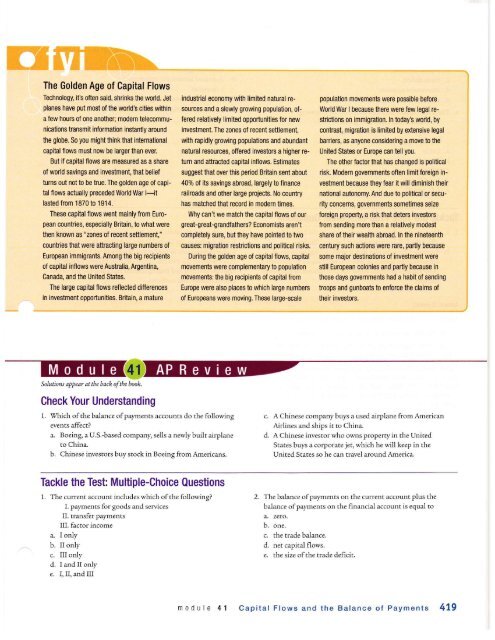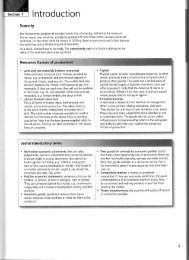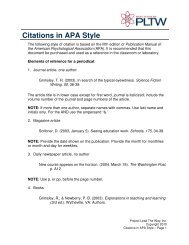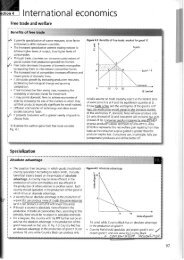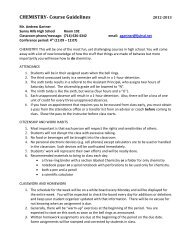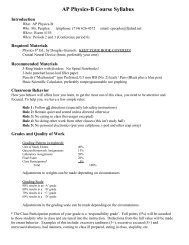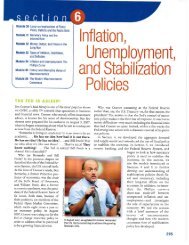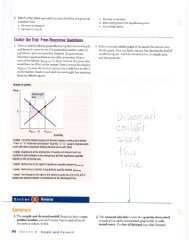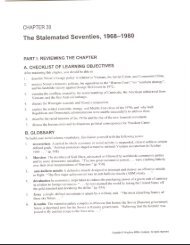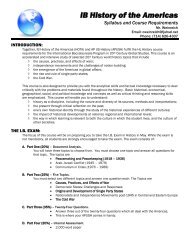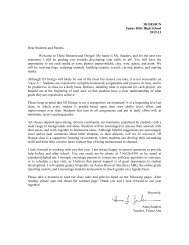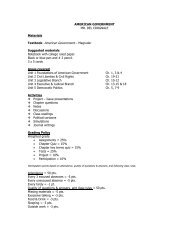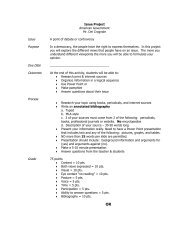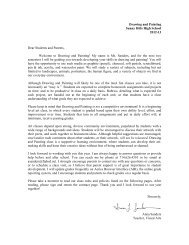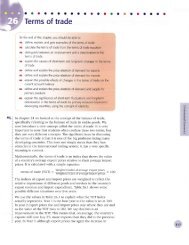AP Econ Module 41 Capital Flows Balance Payments - Sunny Hills ...
AP Econ Module 41 Capital Flows Balance Payments - Sunny Hills ...
AP Econ Module 41 Capital Flows Balance Payments - Sunny Hills ...
You also want an ePaper? Increase the reach of your titles
YUMPU automatically turns print PDFs into web optimized ePapers that Google loves.
The Golden Age of <strong>Capital</strong> <strong>Flows</strong><br />
Techn0logy, it's often said, shrinks the world. Jet<br />
planes have put most olthe world's cities within<br />
a few hours of one another: modern telecommu-<br />
nications transmit information instantly around<br />
the globe. So you mightthink that international<br />
capitalflows must now be largerlhan ever<br />
But if capital fl0ws are measured as a share<br />
of world savings and investment, that belief<br />
turns out not t0 be kue. The golden age of capital<br />
llows actually preceded World War l-it<br />
lasted from 1870 to 1914.<br />
These capitalllows went mainly lrom Eur0-<br />
pean countries, especially Britain, to what were<br />
then known as "zones of recent settlement,"<br />
countries that were attracling large numbers 0f<br />
European immigrants. Among the biq recipients<br />
0t capital inflows wereAustralia, Argentina,<br />
Canada, and the United States.<br />
The large capital tlows reflected differences<br />
in investment 0pp0rtunities. Brilain, a mature<br />
<strong>41</strong>w<br />
Soluions appear at the bach ofthe baoh.<br />
Check Your Understanding<br />
1. Which ofthe balance ofpayments accounts do the ftrllowing<br />
events affecc?<br />
a. Boeing, a U.S.-based conpany, sells a newly built airplane<br />
to China.<br />
b. Chinese invescors buy stock in Boeing frorn Americans.<br />
Tackle the Test: Multiple-Choice Questions<br />
L The current account includcs which oFthe lollowing?<br />
I pa;T nen ts for goods aLtd :ervices<br />
II. rransFer paymencs<br />
IIL lactor incorne<br />
a. I only<br />
b. II on\,<br />
c. III only<br />
d. I and II only<br />
e. l, ll, and lll<br />
industrial economy with limited natural re-<br />
sources and a sl0wly growing population, of-<br />
fered relatively Iimited opportunities for new<br />
investment. The zones 0f recent settlement,<br />
with rapidly growing populations and abundant<br />
natural resources, offered investors a higher re-<br />
turn and attracted capital inflows. Estimates<br />
suggest that over this period Britain sent about<br />
40% ol its savings abroad, largely to finance<br />
raikoads and other large projects. No country<br />
has matched that record in modern times.<br />
Why can't we match the capitalflows of our<br />
great-great-grandfathers? Ec0n0mists aren't<br />
completely sure, but they have pointed to two<br />
causes: migration restrictions and political risks.<br />
During the golden age of capital flows, capital<br />
movements were complementary to population<br />
movemeflts;the big recipients 0f capitalfrom<br />
Europe were also places to which large numbers<br />
of Europeans were moving. These large-scale<br />
population movements were possible before<br />
World War I because there were lew legal re-<br />
strictions 0n immigration.ln today's world, by<br />
contrast, migration is limited by extensive legal<br />
barriers, as any0ne considering a move t0 the<br />
United States 0r Europe can tellyou.<br />
The other factOrthat has changed is political<br />
risk. l\4odern governments otten limit foreign in-<br />
vestment because they fear it will diminish their<br />
national autonomy. And due t0 politicalor secu-<br />
rity concerns, governments sometimes seize<br />
toreign property. a risk that deters investors<br />
from sending more than a relatively modest<br />
share 0ftheir wealth abroad. ln the nineteenth<br />
century such actions were rare, partly because<br />
s0me major destinations of investment were<br />
still European colonies and partly because in<br />
those days governments had a habit of sending<br />
troops and gunboats to enforce the claims 0f<br />
their investors.<br />
A Chinese con-rpany buys a used airplane fn;m American<br />
Airiines and ships it to China.<br />
A Chinese invescor who ou'ns property in the United<br />
Statcs buys a corporatejet, which he will keep in che<br />
Unircd Srert. so hc .an rrarcl arounJAncr.ita.<br />
2. The balance ofpayments on the currenc account plus the<br />
balance ofpaymerrts on the financial accounc is equal to<br />
b. one.<br />
c- the trade balance.<br />
d. net capital florvs.<br />
e. the size ofthe trade deficit.<br />
module 4l <strong>Capital</strong> <strong>Flows</strong> and the <strong>Balance</strong> ot <strong>Payments</strong> 479


